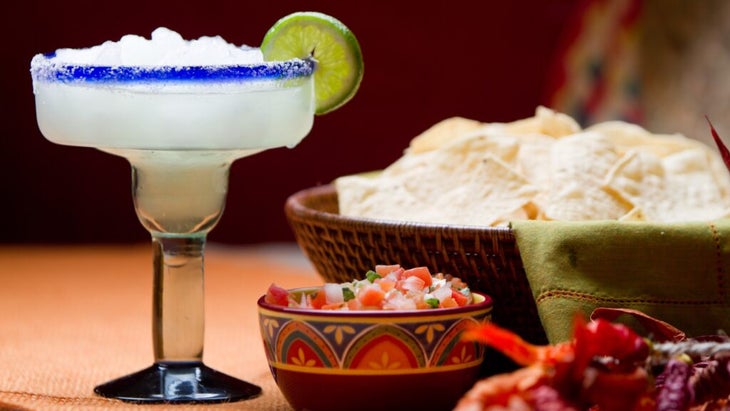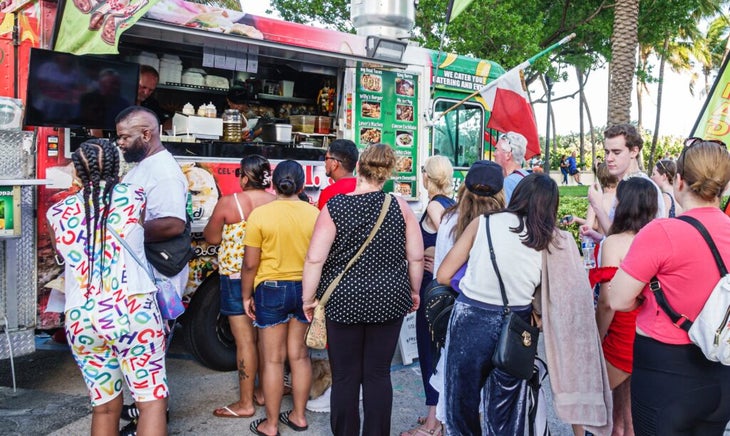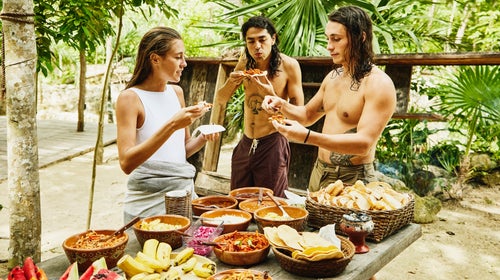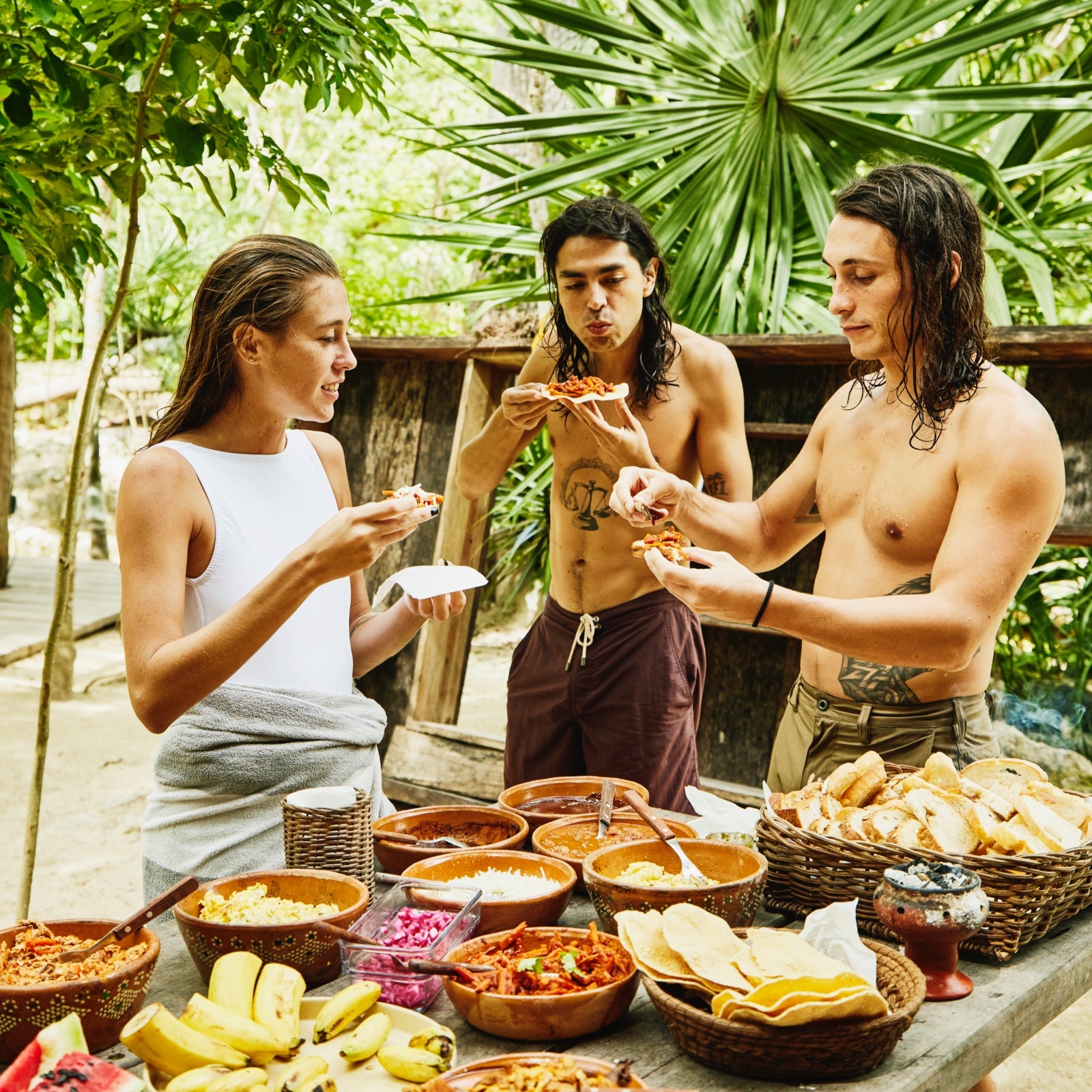Any number of concerns are on our radar as we plan our next trip, from serious issues like how destinations are working to mitigate tourists’ environmental impact to inconveniences like months-long passport wait times. In this column, our travel expert addresses your questions about how to navigate the world.
I’m going to Mexico City and have heard that the food scene is incredible. But a friend of mine just went there and got a parasite, and she thinks it came from a meal at a food truck. I’m an adventurous eater, but I want to avoid getting sick. How can I protect myself when I’m traveling and eating out all the time? —A Queasy Foodie
Whether you’re having carnitas from a roadside taco stand��in Mexico��or dumplings from a teahouse in Nepal, experiencing local food culture is one of the joys of travel, as it sounds like you well know. But contracting a foodborne illness far from home can be traumatic, dulling even the most adventurous palates and even scaring travelers from returning to a destination.
When Anne Driscoll told friends that she and her family would be visiting Punta Mita, Mexico, she received unanimous advice: be wary of what you eat and drink. At least a half��dozen friends who had already traveled to the small Pacific-coast surf town had experienced gastro disasters. Forewarned, she took every precaution, from increasing her normal probiotic doses before the��trip to avoiding fresh produce while there and only drinking bottled water throughout her stay. However, the��entire family still got��extremely ill. “It was catastrophic,” she says. “I was violently expelling the contents of my stomach through both ends.”
Driscoll was the first to fall ill. She thinks a hamburger she ate at the resort restaurant might have been the culprit. She��assumed it would be harmless if cooked well-done. Her husband and two teenage daughters relaxed their guard��the final day of vacation and had ice in their drinks. The ice potentially could have caused the 24 hours of intestinal agony that, unfortunately, overlapped with their flights home to New Mexico. “They used up all the barf bags on the plane, and my youngest got sick in four different places throughout the Dallas airport,” she says. Driscoll has no plans to return to Mexico anytime soon. “I know it’s not logical, but the experience was so bad that I can’t imagine going back and risking it again,” she says.
Each year one in six Americans comes��down with food-related illnesses caused by bacteria, viruses, or parasites. Some countries, like Mexico, have a reputation for felling travelers with gastrointestinal bugs (who hasn’t heard of Montezuma’s revenge?). Developing countries, especially ones with humid climates where bacteria breed more easily, tend to be dicier, says Dr. Kyle Staller, director of the Gastrointestinal Motility Laboratory at Massachusetts General Hospital in Boston. “But you can get sick from contaminated water or an improperly handled burger patty anywhere in the world, including the U.S.,” he adds.
Causes of GI Distress

Food-related illnesses are caused by , including salmonella,��E. coli, norovirus, and giardia. They often fester on raw or undercooked meat, raw vegetables, food stored at unsafe temperatures, or food prepared in an unsanitary manner or with contaminated water.
“Don’t drink the water” is a common travel precaution, especially when visiting third-world countries. According to the Centers for Disease Control and Prevention, more than 180 countries, including popular vacation spots like Mexico, Thailand, and Belize, have tap water considered unsafe for consumption. Even if it is potable, drinking water��in a far-flung locale can still cause GI distress, cautions Dr. Lynne Ahn, an integrative gastroenterologist in Boston. “Everyone’s gut biome is unique,” she explains. “If the mineral or salt content of the water in a destination is different from what you’re used to at home, you could experience discomfort or worse.”
Traveler’s diarrhea is a common illness, affecting between 30 percent and 70 percent of people on the road, according to the CDC. Depending on the bacteria, parasite, or virus, you could end up suffering a few hours or even a week, and experience vomiting, stomach cramps, body aches, and a fever. People who have irritable bowel syndrome or a compromised immune system are often at greater risk of more serious side effects,��says Staller.
Best Practices
No one wants to spend vacation sitting on or hovering over a toilet. A good rule of thumb is to drink filtered or bottled water (although try to avoid single-use plastics, opting instead for glass bottles or cans) when traveling to a destination with questionable water quality. Ahn also recommends making sure all beverages arrive sealed, and wiping off the container before taking a sip. Even small quantities of dirty water can have serious repercussions, so it’s smart to avoid ice and use filtered or bottled water to brush your teeth, she says.
If you really want to play it safe, stick to familiar foods, says Kendra Weekley, a gastrointestinal specialist at the Cleveland Clinic. Different diets create different gut flora, which is why locals in Kerala, India, are able to handle a fiery curry but that same dish, even if the ingredients are uncontaminated, may leave an��American traveler with an upset stomach. In high-risk gastro-disaster destinations like India and Nepal, travelers may find it’s wise to carry��a stash of snacks like protein bars and instant oatmeal, especially if they’re undertaking an adventure like trekking or mountaineering.
A study of students��traveling to Mexico showed that those who took two tablets of Pepto Bismol four times a day were 60 percent less likely to experience traveler’s diarrhea.
Unfortunately for healthy eaters and vegetarians, fresh, unprocessed, and highly nutritious foods like vegetables and fruits will most likely get you sick in a country without rigorous sanitation standards, says Staller, who advises avoiding lettuce as well as produce that doesn’t have peelable skin. And like at home, travelers should be wary of raw and undercooked seafood and meat, he adds.
If you’ve been justifying an extra glass of cabernet or vodka and soda, thinking it can help ward off germs, think again. While some studies have suggested that drinking alcohol with a meal can reduce the chance of food poisoning, due to increased acidic content in the stomach, Staller says alcohol cannot kill foodborne pathogens and will most likely just leave you dehydrated.
Where You Can Safely Eat

It may sound like you have to live off packaged snacks, but avoiding gastro issues doesn’t necessarily mean sacrificing culinary pleasures. Food is one of the best vehicles to explore a culture and can typically be enjoyed without incident if you take proper precautions, says Staller.
In general, eating from street-food vendors is riskier than dining at a restaurant. That’s because in many developing countries, hawker carts and food trucks aren’t held to the same food-safety standards. If you do choose to eat street food, however, try to catch��a glimpse of the preparation area. Does the kitchen look clean? Are food handlers wearing gloves? Are raw meat and raw vegetables being��handled separately to prevent cross��contamination?
A long line is often a sign of good quality, says Staller. This tenet applies to restaurants, too. “When there’s a high degree of turnover with diners, ingredients are being used versus sitting in a refrigerator that might have an unreliable power supply,” he says. Foods left out for long periods, especially in humid environments, are more likely to put the eater at risk of developing food poisoning. Which is why experts always suggest skipping the buffet.
Ed and Christy Rossi learned this lesson the hard way on a trip to Marrakech, Morocco. The weeklong conference they attended provided a daily lunch buffet, with dishes heated by warming trays and salads kept fresh with misters. But it wasn’t long before��the couple succumbed to vomiting and bloody diarrhea. “I thought we were dying,” recalls Ed. Upon returning home to Colorado,��they immediately went to their doctor for antibiotics and discovered they’d contracted shigella, a gastro superbug. The experience hasn’t prevented them from returning to Morocco, but they’ve sworn off buffets in general.
Avoiding fresh fruits and vegetables extends to condiments, something even cautious eaters may overlook, says Staller. A bowl of salsa looks inviting when you’re noshing nachos, but anything made from raw vegetables or fruits can be trouble. And it doesn’t hurt to wipe off the opening of that bottle of hot sauce or ketchup before use.
Preventative Measures
Some evidence suggests that taking probiotics two weeks prior to travel, and while traveling, can reduce the rate of traveler’s diarrhea, says Weekley��of the Cleveland Clinic. However, different strains of “good” bacteria affect people differently, so find what works for you and take an effective dose (ask your doctor or pharmacist). Side effects can include bloating or gas. If the thought of getting sick is causing you stress, probiotic pills are a low-risk, potentially high-reward precaution, she says.
But also: travel anxiety can often unsettle your stomach before you even reach your destination.��Says Weekley, “If your mind is stressing over packing and getting to the airport, your gut will feel it.”��Breathing techniques and free meditation apps like Breethe or Headspace can help calm your nervous system ahead of travel or while on the plane.
And be sure to stay hydrated on the flight. “People don’t want to get up to use the bathroom and end up dehydrated and constipated,” says Weekley. If you’re prone to getting backed up from flying or an atypical diet, she suggests traveling with soluble fiber supplements or a stool softener like MiraLax.
Staller regularly works in developing countries and says he has a tendency��to suffer from GI problems. His go-to? That tried-and-true recommendation: Barbie-pink Pepto Bismol. A of students traveling to Mexico showed that those who took two tablets of Pepto Bismol��four times a day were 60 percent less likely to experience traveler’s diarrhea. Staller says that’s his regimen the minute he hits the ground and throughout a trip. He notes, though, that Pepto Bismol’s active ingredient, bismuth subsalicylate, can cause alarming but harmless symptoms such as black stools or a black tongue.
What to Do if You Get Sick

If you contract a foodborne illness, symptoms such as stomach cramps, chills, vomiting, and diarrhea typically start within hours but can also occur several days after ingesting��tainted food or drink. When you’re ill, your body tends��to lose a lot of liquid, so staying hydrated is crucial. “It’s often dehydration that makes you feel more sick,” says Staller. He recommends traveling with oral rehydration salts, which are absorbed more effectively by the body than water alone. “It’s like the equivalent of an IV,” he says.
Traveler’s diarrhea is largely resistant to antibiotics, he says, so your best plan is to be close to a bathroom, stay hydrated, and ride it out. If you have severe symptoms, like a fever or blood in your stool, seek out medical care.
If you’re an omnivore and an intrepid traveler, chances are you’ll be hit with a gastro catastrophe at some point in your journeys. Often disaster strikes when you let your guard down or simply don’t trust your gut. I tend to have a stomach of steel. The��two times I have gotten food poisoning I questioned what I was consuming yet��proceeded anyway to be polite to my hosts. All it took was the smallest sip of a lassi that had been sitting out in the sun in Varanasi, India, and a tiny bite of goat stew in the Omo Valley of Ethiopia to cause me 24 hours of anguish. Lesson learned: table manners don’t always apply on the road.
Have a question of your own? Drop us a line at Traveladvice@outsideinc.com.��

�����ԹϺ��� correspondent Jen Murphy became an omnivore after an eight-year stint working at Food and Wine magazine. She’s since eaten everything from guinea pig to grasshoppers to fried cod sperm sacs and has remarkably only been hit with two major gastro disasters in all of her world travels.��


